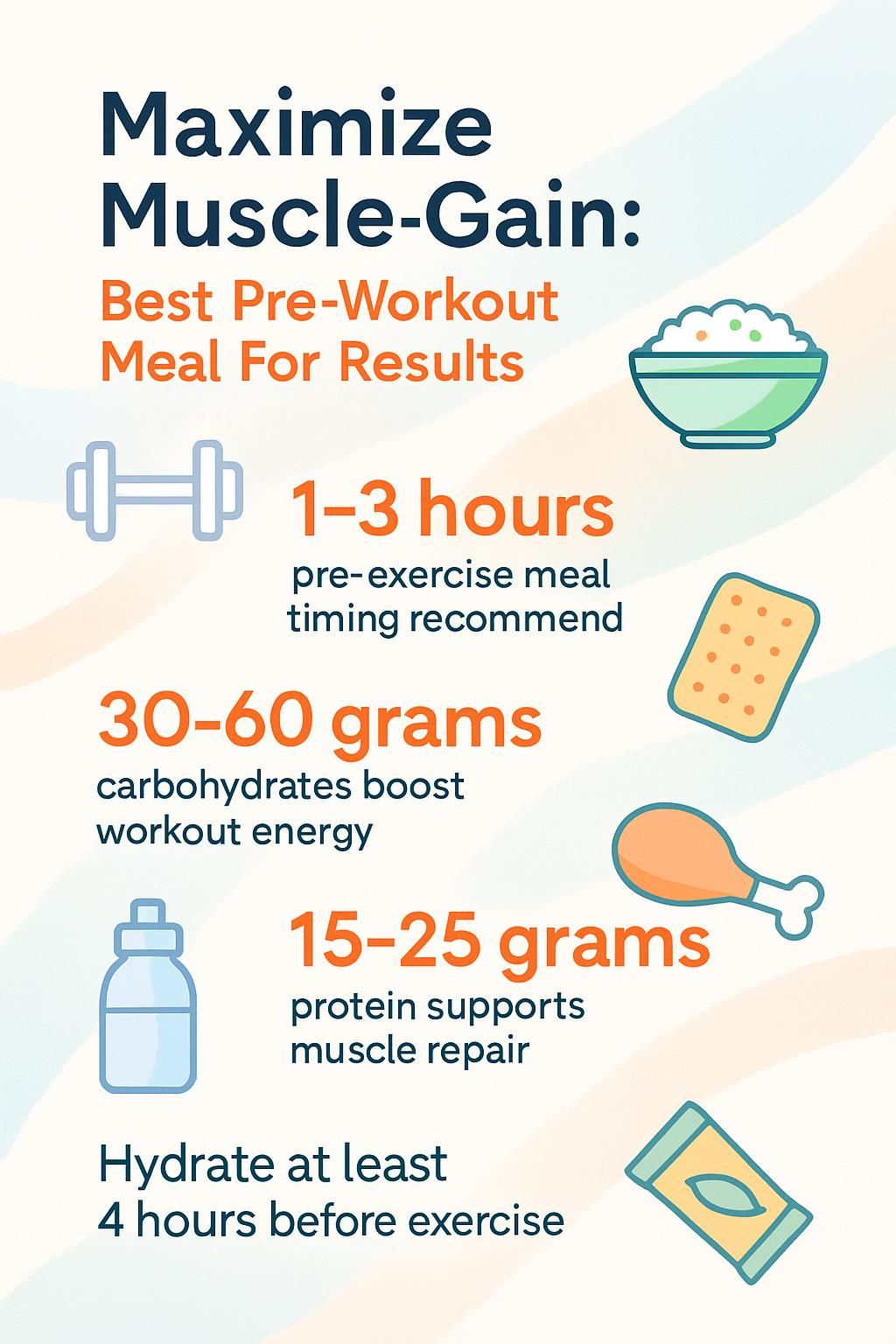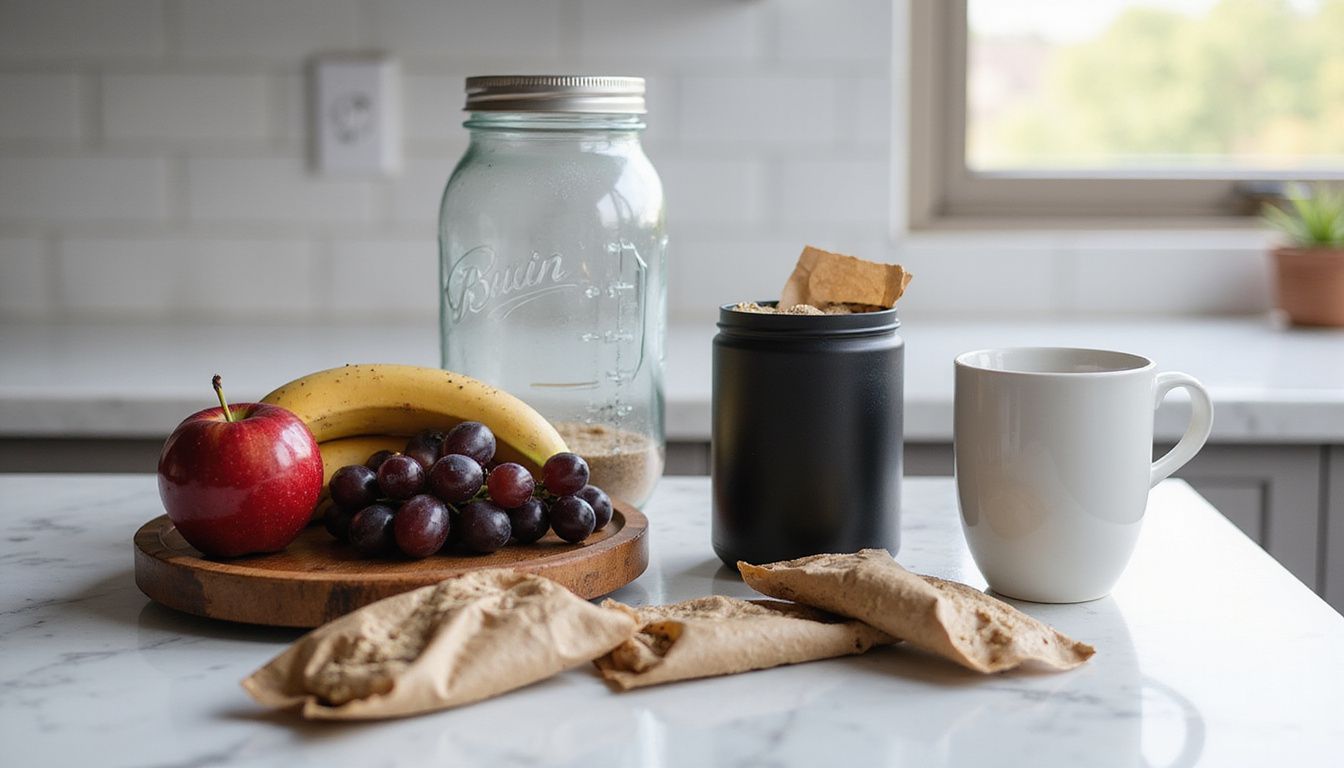Maximize Muscle Gain: Best Pre-Workout Meal For Results
Our Nutrition Assistant AI Suite will transform your body. You will lose fat, get toned, and build muscle. Gain confidence and optimal health.
You work hard in the gym, yet muscle growth can still feel slow. A smart pre-workout meal helps you show up with energy, protect muscle from breakdown, and support muscle gain. With the right pre-workout plan, you can fuel your body and lift with confidence.
This guide shows you what to eat before a workout, when to eat it, and why each choice matters for building stronger muscle. You will see simple steps you can use today.
Small nutrition changes can power up every workout you do.
Key Takeaways
- Eat a balanced pre-workout meal 1 to 3 hours before training. Aim for 30 to 60 grams of carbohydrates and 15 to 25 grams of protein.
- Choose complex carbs, such as oatmeal or brown rice, to refill glycogen so you have steady energy during workouts longer than 60 minutes (ISSN, 2020).
- Daily protein near 1 gram per pound of body weight supports muscle repair and helps prevent tissue breakdown while dieting.
- Hydrate early. Begin drinking fluids at least four hours before exercise, since even mild dehydration can reduce strength and endurance (ACSM guidance).
- Avoid heavy, high-fat meals and sugary snacks before training. These can cause sluggishness, stomach upset, blood sugar crashes, and weaker performance.

Why Pre-Workout Nutrition Is Essential for Muscle Gain

Well-timed food helps you arrive ready to train and ready to grow. Good pre-workout nutrition gives you fuel for hard sets, supports muscle building, and steadies focus.
Why do pre-workout meals impact muscle growth?
Your muscles need fuel to perform and materials to rebuild. Carbohydrates top off glycogen, the stored form of glucose. Protein provides amino acids, the building blocks your body uses to repair and grow muscle. Eating both before training can increase muscle protein synthesis, the process that builds new muscle tissue.
Skipping this meal can leave you flat, which makes tough sets harder and recovery slower. A balanced plate 1 to 3 hours before you train keeps blood sugar steady and delivers amino acids during and after training, which supports muscle gain over time.
How do nutrients enhance workout performance?
Carbohydrates are your main training fuel, especially for high-intensity work. They raise blood glucose and refill glycogen in both your liver and skeletal muscle. The International Society of Sports Nutrition notes that sessions longer than an hour can drain glycogen, which limits endurance and power.
Protein supports repair. A protein shake or a cup of Greek yogurt supplies amino acids that limit soreness and aid muscle recovery. Healthy fats, such as those from avocado or peanuts, digest slowly and support longer efforts without feeling heavy.
Hydration matters too. Drinking water before and during training helps prevent cramps and early fatigue. With the right mix of carbs for fuel, protein for repair, healthy fats for steady energy, and fluids for circulation, you can perform well from the first rep to the last.
Key Nutrients for a Pre-Workout Meal
Food choices before training set the tone for energy, strength, and recovery. Focus on the big three macronutrients, then dial in fluids and electrolytes.
Why are carbohydrates important for workout energy?
Carbohydrates are the body’s preferred source of energy during exercise. Your body converts carbs to glucose, which is stored as glycogen in muscle. Workouts that last more than 60 minutes can use up a large share of that storage, which hurts performance.
Eating complex carbs like oatmeal, brown rice, sweet potato, or whole grain bread supports steady energy and reduces the risk of low blood sugar. A target of 30 to 60 grams of carbs in your pre-workout meal or snack works well for many people who want to build muscle.
Eating enough quality carbohydrates keeps you from feeling hungry during your workout, says registered dietitian Anna Smith.
On days I trained hard after a low-carb morning, my energy faded fast. Oatmeal with banana before training made a clear difference within minutes.
How does protein support muscle repair and growth?
Training breaks down muscle fibers, and protein helps rebuild them. Eating protein before your workout raises muscle protein synthesis and supplies amino acids while you train. A simple target is 15 to 25 grams of protein in your pre-workout meal for most adults. If you weigh about 140 pounds, that range fits well.
Getting close to 1 gram of protein per pound of body weight per day supports muscle maintenance during a calorie deficit and helps growth during a surplus. Easy choices include chicken, eggs, Greek yogurt with nuts, or a smoothie with protein powder.
What benefits do healthy fats provide before exercise?
Healthy fats from nuts, fish, and avocado support longer efforts and can help you feel satisfied. Your body uses more fat during lower-intensity or endurance work, such as easy cycling or long runs. Pairing a modest amount of fat with carbs can steady energy and curb hunger.
Keep portions moderate if you plan to eat within 90 minutes of exercise. Too much fat slows digestion and can cause stomach upset during high-intensity sessions.
Why is hydration critical for peak performance?
Water supports blood flow, temperature control, and nutrient delivery. Even mild dehydration can reduce strength and endurance. The American College of Sports Medicine suggests starting hydration several hours before training. If your urine looks dark two hours before exercise, increase fluids and consider a little sodium to aid fluid balance.
Proper fluids help you use carbohydrates efficiently during exercise. Severe dehydration can be dangerous. In rare cases, extreme training without enough water and electrolytes can raise the risk of serious muscle injury.
Timing Your Pre-Workout Meal
Good timing turns a solid menu into reliable performance. Think of it as matching digestion to the clock.
When should I eat if I have 2-3 hours before working out?
Eat a full meal with carbs, lean protein, and a small amount of healthy fat 2 to 3 hours before you train. Examples include a whole grain sandwich with sliced chicken and a side salad, or salmon with half a sweet potato and vegetables.
This window gives you time to digest and to load muscles with fuel. Balanced portions help you feel strong instead of sluggish when your session starts.
What’s the best pre-workout meal timing 1-2 hours before exercise?
If you have 60 to 90 minutes, choose a smaller, easy-to-digest meal. Combine carbs and protein, and go light on fat and fiber.
- Omelet with whole grain toast and sliced avocado, plus a cup of fruit
- Oatmeal with a scoop of protein powder, banana slices, and a few almonds
- Almond butter and fruit spread sandwich on whole grain bread
Drink water with the meal. This supports muscle function and keeps energy steady once training starts.
Is it okay to eat within an hour before a workout?
Yes, if you keep it light and simple. Pick foods that digest fast and will not cause stomach distress.
- Greek yogurt with fruit
- A banana
- A protein smoothie with water, berries, and protein powder
- A small nutrition bar or an apple
Choose snacks low in fat and fiber. Smaller portions help prevent cramping and fatigue during intense work.
Best Pre-Workout Meal Ideas
Here are reliable meals that cover carbs, protein, and supportive fats. Each option fuels your workout and supports recovery.
What makes chicken and brown rice with vegetables a good pre-workout meal?
This combo checks every box. Chicken breast delivers about 27 grams of high-quality protein per serving with little fat. Brown rice provides complex carbs to refill glycogen, and mixed vegetables add fiber plus vitamins.
Many lifters like this plate because it fuels hard training without a crash. It is simple to prepare and easy to adjust for your calorie needs.
How does oatmeal with fruit and protein powder fuel workouts?
Oatmeal offers slow-digesting carbs that keep blood sugar stable. A scoop of protein powder adds the amino acids your muscles need during and after training.
Topping with a banana or berries gives quick carbs and antioxidants. This is a strong choice if you plan to eat about 90 minutes before you train.
Why choose Greek yogurt with berries, nuts, and honey before exercise?
One cup of Greek yogurt packs around 20 grams of protein. Berries add simple carbs for quick energy, and nuts bring healthy fats for staying power. A drizzle of honey gives a fast boost right as you begin.
You can up or downshift portions based on your goals. It digests quickly and supports steady energy during most workouts.
What are the benefits of whole grain toast with avocado and scrambled eggs?
Whole grain toast supplies complex carbs for stable energy. Avocado adds healthy fats and minerals like potassium and magnesium. Eggs provide complete protein and vitamin B12 for muscle repair and nerve function.
The meal is nutrient-dense yet simple to digest, which makes it a good pick before the gym.
How does a smoothie with banana, almond butter, and protein powder support workouts?
This blend digests quickly and is easy to drink close to training. Banana gives fast carbs and around 422 milligrams of potassium for cramp control. Almond butter offers healthy fats for longer efforts, and protein powder raises total protein to support muscle repair.
Use water or ice for hydration. Most people can make and finish this in five minutes.
Quick Pre-Workout Snack Options
When time is tight, portable snacks can still fuel quality work. Use these picks to bridge the gap.
What are healthy trail mix options before workouts?
Trail mix with raisins or other dried fruit supplies quick carbs. Almonds or pumpkin seeds add protein and healthy fats. Antioxidants in dried berries may support performance by reducing oxidative stress during exercise.
Try a homemade mix: low-sugar cereal, unsalted almonds, pumpkin seeds, dried blueberries or cranberries, and a few dark chocolate chips. A 40 gram serving often gives about 30 grams of carbs and 6 to 8 grams of protein.
Choose mixes with minimal added sugar. This keeps energy steady without a crash.
^1 Current Sports Medicine Reports, 2014, “Dietary Antioxidants in Sports Nutrition.”
How do rice cakes with peanut butter and banana help pre-exercise?
Rice cakes are light and provide quick carbohydrates. Peanut butter adds protein and healthy fats that keep you satisfied. A medium banana brings potassium, which helps muscles contract well and supports normal blood pressure during intense work.
Two rice cakes with one tablespoon peanut butter and half a banana provide roughly 200 calories, about 35 grams of carbs, 5 grams of protein, and more than 200 milligrams of potassium. It is fast fuel without a heavy feel.
Why is low-fat chocolate milk a good quick snack?
Low-fat chocolate milk gives an easy 4 to 1 carb to protein ratio, which helps refill glycogen and supports muscle repair. Research with athletes shows it can match or beat some sports drinks for recovery.
It is portable and digests easily if you need a quick option. This works before training or right after you finish.
Are protein bars or balls effective pre-workout snacks?
Yes, if you pick quality options. Many bars and protein balls provide at least 15 to 20 grams of protein and a moderate amount of carbs. That mix supports muscle repair and gives quick energy without a big sugar spike.
They fit well when you have only an hour or less before lifting or cardio. Look for lower added sugar and solid protein sources such as whey, soy, or pea.
How does an apple with almond butter work as a snack?
An apple provides fast, simple carbs. Almond butter brings healthy fats and a little protein, which slows digestion and smooths your energy curve.
This pairing keeps blood sugar steady and reduces mid-workout hunger. It is a smart choice when you want fuel without a heavy stomach.
Foods to Avoid Before a Workout
Some foods can spoil a good session. Steer clear of options that slow digestion or spike and crash your blood sugar.
Which high-fat and fried foods should I avoid pre-workout?
Skip fried foods like French fries, fried chicken, and onion rings. Also limit pizza loaded with cheese, creamy dips, and fatty processed meats such as sausages. These meals are high in saturated fat, which slows digestion and can cause a heavy, sluggish feel.
Greasy food right before training raises the chance of bloating and cramps. Save these items for times far from your workout window.
Why avoid sugary snacks or desserts before exercising?
Candy bars, pastries, and cookies can spike insulin quickly, then send your energy crashing. A sudden drop in blood sugar hurts power and focus during exercise.
Carbs from whole grains or fruit provide longer-lasting energy. Choose those instead of refined sweets when you need pre-workout fuel.
What problems do large, heavy meals cause before workouts?
Big meals keep more blood in your gut for digestion. That means less blood flow to working muscles. You may feel too full, slow, or crampy when you try to push hard.
Meals that are very high in fiber or fat can be uncomfortable during intense training. Keep portions smaller as you get closer to your workout start time.
Supplements to Consider Before a Workout
Some supplements can support energy, power, or recovery. Use them to fill gaps, not to replace smart meals.
How do BCAAs aid muscle recovery?
BCAAs, or branched-chain amino acids, are three essential amino acids used for muscle repair. Taking BCAAs before training may reduce muscle breakdown and lessen soreness after hard sessions.
People often report feeling less sore the next day when they sip BCAAs around training. They can be handy when you train early and cannot eat much.
What benefits do pre-workout powders offer for energy?
Many pre-workout powders combine caffeine, beta-alanine, creatine, B-vitamins, and amino acids. Caffeine boosts alertness. Beta-alanine can delay the burn, which helps you finish long sets. Creatine supports short bursts of power.
Take pre-workout powder 30 to 45 minutes before training. Evidence suggests these blends can improve strength and focus for many users.
Can creatine improve strength gains before training?
Creatine is well studied for strength and power. A common dose is 3 to 5 grams per day. Research shows it can help you lift more weight and increase muscle mass over time.
Talk with a healthcare professional before you start. This ensures the dose and timing fit your goals and health needs.
Common Mistakes in Pre-Workout Nutrition
A few common missteps can stall progress. Avoid these to get more from every session.
Why is skipping the pre-workout meal a mistake?
Training without fuel makes hard work feel even harder. Your body may pull energy from muscle tissue if carbs are too low, which slows muscle gain.
Studies suggest that planned protein and carbs before exercise help protect muscle and support better performance.^1 A small meal can be the difference between a strong day and a flat one.
^1 Phillips SM et al., “Dietary protein for athletes: From requirements to metabolic advantage,” Appl Physiol Nutr Metab, 2016.
What happens if you overeat or eat too close to your workout?
Large portions right before training can cause cramping, bloating, or nausea. Your body is busy digesting, while your muscles demand blood flow for movement.
Give at least one hour after a small snack and two to three hours after a big meal. You will likely lift better and feel more comfortable.
How does neglecting hydration affect exercise performance?
Even a small fluid loss, about 2 percent of body weight, can decrease strength and endurance. Water moves nutrients to muscle and helps control body temperature. Low fluids mean your heart works harder and your reaction time may slow.
Hydration can affect performance more than missing a single nutrient. Start early and keep sipping during training.^1 ^2
^1 American College of Sports Medicine, Hydration Guidelines.
^2 Journal of Applied Physiology, 2019, “Fluid Balance Impacts Exercise Performance.”
Hydration Tips for Workouts
Think of hydration as a steady drip, not a last-minute chug. Small, regular sips work best.
How much water should I drink before, during, and after exercise?
Two hours before training, drink 2 to 3 cups of water. During exercise, sip 1/2 to 1 cup every 15 to 20 minutes.
After training, weigh yourself if possible. For each pound lost, drink 2 to 3 cups of fluid to rehydrate. This plan helps performance and may reduce next-day soreness.
Some people also use electrolyte drinks during long or hot sessions for faster replacement.
When should I use electrolyte drinks during intense workouts?
Use electrolyte drinks when your workout lasts longer than 60 minutes or you sweat heavily. Long sessions can drop sodium, potassium, and magnesium, which are key for muscle function and hydration.
For shorter training under an hour, water is usually enough. During long runs or tough circuits, low-sugar sports drinks or coconut water can reduce cramps and fatigue.
Quick Summary:
- Choose electrolyte drinks for activities over 60 minutes.
- Use them in heat or when you sweat a lot.
- Water is fine for shorter efforts.
- Electrolyte loss rises with workout length and intensity.
Personalizing Your Pre-Workout Meal Plan
Match your fuel to your training style and your personal needs. The right fit helps you feel strong and consistent.
How should I adjust my meal based on workout type?
For high-intensity sessions that last 30 to 75 minutes, focus on carbs for quick fuel and protein for repair. Chicken with rice or oatmeal with protein works well.
For endurance training over an hour, combine carbs, healthy fats, and protein. Options like oatmeal with nuts or whole grain toast with avocado and eggs support steady energy when carb stores run low.
What dietary restrictions and preferences affect pre-workout meals?
If you avoid gluten, pick grains like rice or quinoa instead of wheat bread. For vegan plans, use tofu, tempeh, beans, lentils, or pea protein powder. If dairy causes issues, try yogurt alternatives made from almond or coconut.
For nut allergies, use seeds such as sunflower or pumpkin and seed butters. Always read labels on bars and powders because hidden allergens are common. Adjust carb and protein amounts to your training goals and comfort.
Conclusion
The right pre-workout meal supports muscle gain and better training. Build your plate around carbs for fuel, protein for repair, and a small amount of healthy fat for staying power. Hydrate well so your body can deliver nutrients where they are needed.
Match timing to your schedule, and adjust for workout type and personal needs. For medical conditions, food allergies, or supplement questions, consult a registered dietitian or healthcare professional. Small, consistent habits before you train can turn tough sessions into steady progress.
FAQs
1. What is the best pre-workout meal for maximizing muscle gain?
A balanced pre-exercise meal should include lean protein, complex carbohydrates, and a small amount of healthy fat. For example, grilled chicken with brown rice and steamed vegetables provides amino acids for muscle repair and slow-release energy for sustained performance. Research shows that consuming 20 to 30 grams of protein and 40 to 60 grams of carbohydrates about two hours before training supports optimal results (Aragon & Schoenfeld, JISSN, 2013).
2. How long before exercise should I eat my pre-workout meal?
Eat your main pre-training meal one-and-a-half to three hours before starting activity. This timing helps digestion while ensuring nutrients are available during your workout session. A study in Sports Medicine found that eating within this window improves strength output compared to fasting.
3. Are there specific foods I should avoid in my pre-workout meal?
Avoid high-fat or fried foods as they slow digestion and may cause discomfort during intense movement. Also limit sugary snacks since they can lead to rapid spikes then drops in blood sugar levels; this may reduce endurance mid-session.
4. Can a well-planned pre-workout meal improve recovery after exercise?
Yes; meals rich in quality protein and complex carbs not only fuel performance but also support faster recovery by replenishing glycogen stores and promoting muscle repair post-activity (Phillips et al., Nutrition & Metabolism, 2007). After following these guidelines myself over several months of resistance training, I noticed less soreness the next day along with steady progress on key lifts.
Summary: Eating a nutrient-dense combination of lean proteins and complex carbs one-to-three hours before physical activity boosts both immediate performance and later recovery outcomes according to current research findings.







